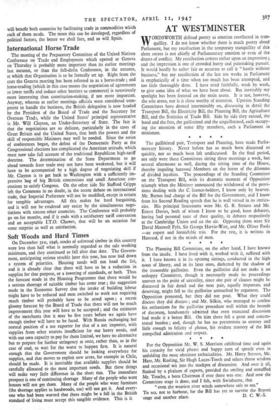AT WESTMINSTER
WORDSWORTH defined poetry as emotion recollected in tran. quillity. I do not know whether there is much poetry about Parliament, but my recollection in the temporary tranquillity of this short recess is not chiefly of Parliamentary emotion or even of the drama of conflict. My recollection centres rather upon an impression ; and the impression is one of crowded hurry and painstaking pursuit. It would hardly be either fair or accurate to call it "hustle without business," but my recollection of the last ten weeks in Parliament is emphatically of a time when too much has been attempted, and too little thoroughly done. I have tried faithfully, week by week, to give some ides of what we have been about. But inevitably my spotlight has been focused on the main arena. It is not, however, the sole arena, nor is it alone worthy of attention. Upstairs Standing Committees have droned interminably on, discussing in detail the Transport Bill, the Electricity Bill, the Planning Bill, the Agriculture Bill, and the Statistics of Trade Bill. Side by side they existed, the bond and the free, the guillotined and the unguillotined, each occupy- ing the attention of some fifty members, each a Parliament in miniature.
* * * * The guillotined pair, Transport and Planning, have made Parlia- mentary history. Never before has so much been discussed so quickly, nor so much been left undiscussed. In the final period, not only were these Committees sitting three mornings a week, but several afternoons as well, during the sitting time of the House, thereby impaling harassed Members on the horns of the dilemma of divided loyalties. The proceedings of the Standing Committee on the Transport Bill, with its dramatic moment of Opposition triumph when the Minister announced the withdrawal of the provi- sions dealing with the C licence-holders, I know only by hearsay. Mr. Barnes had charge of the Bill for the Government, and I know from his Second Reading speech that he is well versed in its intrica- cies. His principal lieutenants were Mr. G. R. Strauss and Mr. Ernest Davies, both of whom I know to be good, keen debaters, having had personal taste of their quality, in debates respectively at the Cambridge Union and on the air. Opposing them were Sir David Maxwell Fyfe, Sir George Harvie-Watt, and Mr. Oliver Poole —an expert and formidable trio. For the rest, it is written in Hansard, if not in the minds of men.
* * * * The Planning Bill Committee, on the other hand, I have known from the inside. I have lived with it, worked with it, suffered with it. I have known it in its opening sittings, conducted in the high noon of liberty, and in its later ones, darkened by the shadow of the inexorable guillotine. Even the guillotine did not make it an unhappy Committee, though it necessarily made its proceedings uneven to the point of unreality, since ohe pair of clauses might be discussed in fair detail and the next pair, equally important and deserving, might fall to the guillotine untouched by argument. The Opposition protested, but they did not pout. What they could discuss they did discuss ; and Mr. Silldn, who managed to confine his enthusiasm for the guillotine procedure well within the bounds of decorum, handsomely admitted that even truncated discussion had made it a better Bill. On him there fell a great and concen- trated burden ; and, though he has no pretensions • to oratory and little enough to felicity of phrase, his evident mastery of the Bill compelled admiration and respect.
* * * * For the Opposition Mr. W. S. Morrison exhibited time and again his capacity for vivid phrase and happy turn of speech even in unfolding the most obstinate technicalities. Mr. Harry Strauss, Mr. Hare, Mr. Keeling, Sir Hugh Lucas-Tooth and others threw wisdom and occasional wit into the stockpot of discussion. And over it all, flanked by a phalanx of experts, presided the smiling and unruffled Mr. Touche, a born Chairman if ever there was one And now the Committee stage is done, and I felt, with Swinburne, that "even the weariest river winds somewhere safe to sea."
To sea, not to harbour, for the Bill has yet to survive the Report


































 Previous page
Previous page